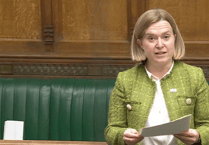Derek Weaving, of Chillington, writes: Dairy farmers cannot escape reality. Richard Haddock's full-page article devoted to dairy farming betrays a surprising narrowness of mind and does a disservice to his constituency as chairman of the Conservative rural affairs group. Moreover, his attempt to emphasise the challenges faced by the industry by comparing the plight of dairy farmers to the poor souls who are suffering in modern-day slavery is an affront to the human values that are the mainstay of our society. Far from providing a useful analysis of the situation in the dairy business, Mr Haddock's article reads like a lament for the kind of cradle-to-grave state support that dragged down the UK economy after the war and is now, thankfully, a fading memory. In Mr Haddock's world, today's dairy farmers, like the coal miners and British Leyland workers of the last century, have an inalienable right to be employed in their chosen industry, ideally in the place where they were born, and for the state to support them financially irrespective of the economic realities. That serious coal mining no longer exists in this country, or that the once mighty British Leyland went bankrupt in 1975, hold no lessons for Mr Haddock. Neither does the fact that successive governments pandered to these industries to the extent that, when economic reality eventuality forced its will, as it always does, it did so with dramatic and devastating consequences for the workers and local communities involved. Milk, like oil, grain or coal, has become a global commodity. Milk is traded across borders and is open to international competition. Like other commodities, the price for milk moves in cycles – up for a while and then down for a while. We don't necessarily have to like this dynamic, but it is a fact of life. Over the period 2006-13, farm gate prices for UK milk had a good run, rising by 76 per cent. Like any good businessman, the diligent dairy farmer understood this trend could not last and planned accordingly. To the prudent farmer, it will have come as no great surprise that 2014 brought a downturn in prices. So for Mr Haddock to write that some dairy farmers were 'persuaded' to invest in new buildings or parlours when milk prices were high is to imply that some of his farming colleagues either do not know or wilfully ignored a fundamental principle of their own business. Mr Haddock's solution to the price downturn is to have, as he puts it, 'a system that ensures everyone can make a profit'. Vladimir Lenin might have applauded, but this is not the approach that has made the UK one of the world's most successful and enduring modern economies. If UK farmers can't produce at prices consumers are prepared to pay, they have the same freedom as the rest of the working population of this country, which is to do something else. Sadly, this is not an option open to the real slaves. l See this week's News of the Weird, back page




Comments
This article has no comments yet. Be the first to leave a comment.